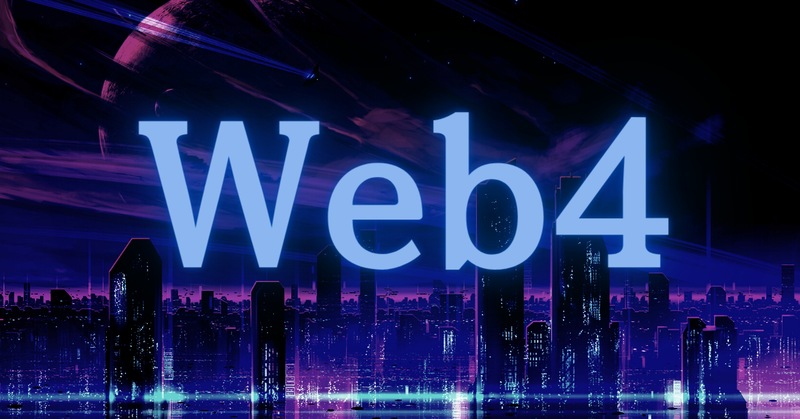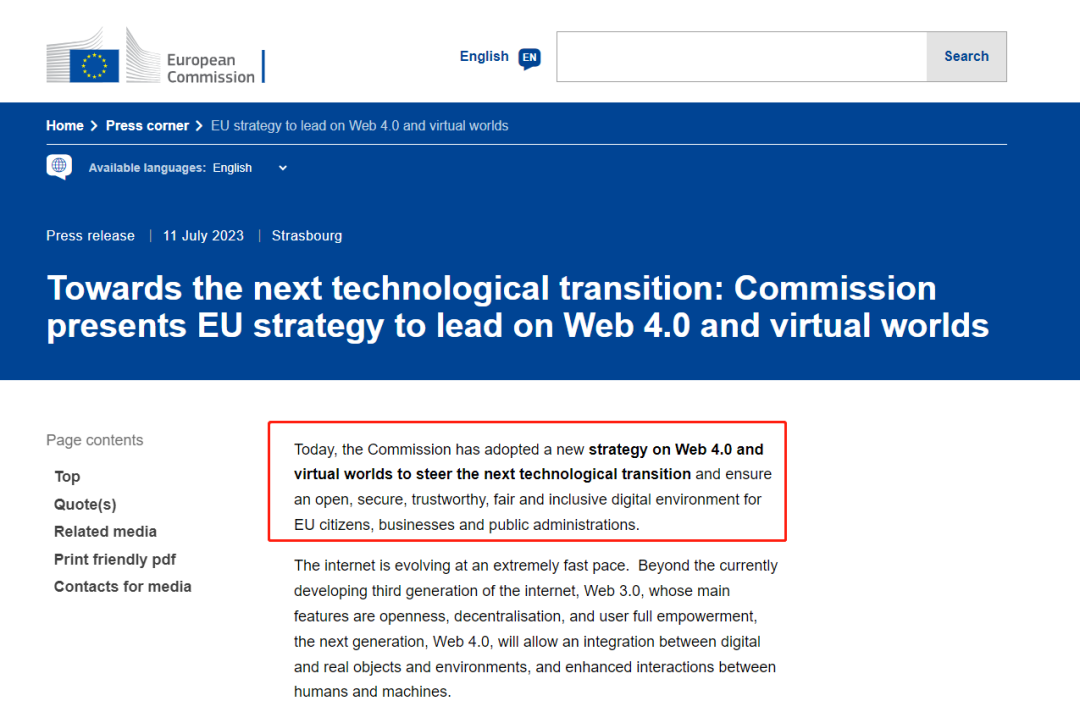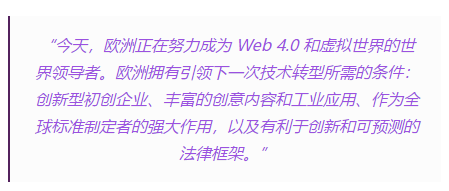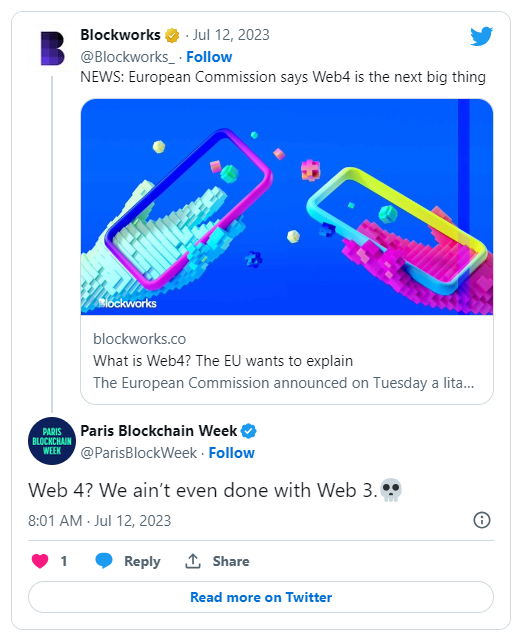The European Commission proposes Web4.0, is it a gimmick or a disruption?
Does the European Commission's proposal of Web4.0 represent a gimmick or a disruption?Reference: Alessandro Adami “European Commission looks to the future and proposes development of Web4 technologies.”
On July 11, the European Commission passed a new strategy on Web4 and virtual worlds to guide the next technological transformation and ensure an open, secure, trustworthy, fair, and inclusive digital environment for EU citizens, businesses, and public administration.
According to the introduction, Web4, which echoes and covers the term Web3, will be part of a new internet vision that integrates virtual experiences, the Internet of Things, and blockchain.
Web3 is not yet understood, and Web4 is already here. Today, let us understand what the Web4 technology proposed by the European Commission is all about.
- Comprehensive Interpretation of Ripple’s Lawsuit with SEC: Both Sides Achieved “Partial Victory”, Multiple Exchanges Re-listed XRP
- Forbes: How did Craig Wright become “Satoshi Nakamoto”?
- Bull market signal? How much longer will Bitcoin stay at $30,000?

The European Commission and Web4: Thinking about the Future of Technology
The strategic background, released on July 11, states that the Internet is evolving at an extremely fast pace. In addition to the third-generation Internet Web3 (whose main features are openness, decentralization, and full user empowerment) currently under development, the next generation Web4 will allow for integration between digital and real objects and environments and enhance interaction between people and machines.

In the EU’s “Economic Outlook after 2030” released in March, digitalization was emphasized as one of its key driving forces, and Web4 is a major technological transformation that will bring a seamless, intelligent, and immersive world.

What is Web4? Based on the description in this strategic report, we can understand it as the evolution of the Web3 concept, where the Internet of Things, blockchain, virtual reality, and augmented reality come together.
Although this sounds very promising, no details have been provided by the official sources on how to mix all the technical facts together and give birth to this innovative concept.
It is well known that the European Commission obtained approval for the MiCA (Markets in Crypto-Assets) in April, opening the doors to cryptocurrencies and blockchain, and now wants to go even further by attempting to compete with US tech innovation.
Many new initiatives were disclosed in this just-released Web4 strategy announcement.
For example, the organization proposed a Horizon Europe plan, called the “Virtual World Partnership,” which is expected to launch in 2025.
The goal of this plan is to develop an “industrial and technological roadmap for virtual worlds” by helping developers, creators, and widely used internet companies understand this new trend.
Additionally, this will need to be tested with all EU member states.
As part of the second idea of the technology expansion plan, a project called “CitiVerse” was envisioned, which is described as a city virtual universe for managing and planning city work and activities in an alternative way, but without detailing its target audience.
Finally, the committee’s other proposed idea involves “European virtual human twins,” human virtual replicas that can help doctors study disease outbreaks and treatments.
Regarding the introduction of new Web4 technology frontiers, European Internal Market Commissioner Thierry Breton commented:

Is Europe Not Ready for Web3?
The European Commission even introduced the term Web4, which represents a new concept in the tech industry.
Despite the fact that Europe’s regulatory framework is set to become one of the most lenient regulatory frameworks in the world in the field of cryptocurrencies and is willing to stand out on the continent in the context of new technology, talking about Web4 seems premature.
A survey conducted by Consensys in June showed that only 8% of the entire alliance are familiar with the concept of Web3.
On the other hand, terms like blockchain, cryptocurrency, and DeFi are still unfamiliar to those who lack experience and have not yet been understood by most people.
For a large number of people who are not familiar with the basics of virtual currency, there are still serious barriers to understanding Web3 or Web4.

Many European centers such as Berlin, London, and Lisbon are becoming centers with very high levels of cryptocurrency and blockchain technology, but other areas on the continent do not even know the meaning of the term “cryptocurrency.”
According to some data surveys, in 2021, the adoption rate of Bitcoin standards in countries such as the United Kingdom, France, and Germany is much lower than that of the better-known cryptocurrency in the United States.
Source: triple-a.io
In recent years, we have seen positive initiatives and trends that will lead to the expansion of the use of blockchain technology in Europe.
For example, in the first quarter of 2023, 50% of start-ups with investment in cryptographic projects will come from Europe.
However, despite data showing that the interest of investors, entrepreneurs, and developers on the continent is growing, unfortunately, people are still concerned that the term “Web4” introduced by the European Commission is still a completely worthless concept.
Whether Web4 is a “gimmick” or a real thing remains to be seen. Perhaps everything needs to be left to time.
If you want to learn more about the European Commission’s strategy to lead the EU in Web 4.0 and the virtual world, you can click on the original text to learn more:
https://ec.euroBlocking.eu/commission/presscorner/detail/en/ip_23_3718
We will continue to update Blocking; if you have any questions or suggestions, please contact us!
Was this article helpful?
93 out of 132 found this helpful
Related articles
- Bitcoin stays stable at $30,000, is this a signal of a bull market?
- Galaxy Digital Founder: Bitcoin ETF Will Become SEC’s “Stamp of Approval”
- CoinMarketCap: Overview of the Overall Status of Trading Platforms in the First Half of 2023
- An Explanation of Taproot: Consisting of Three Different Bitcoin Improvement Proposals
- Boring Ape’s decline continues, where should the NFT market break the ice?
- 2017 vs 2023: Fink’s Institutional Bitcoin Perspective
- What is the difference between the supervision and sharing agreement and the information sharing agreement, as institutions compete to include them in ETF filings?



